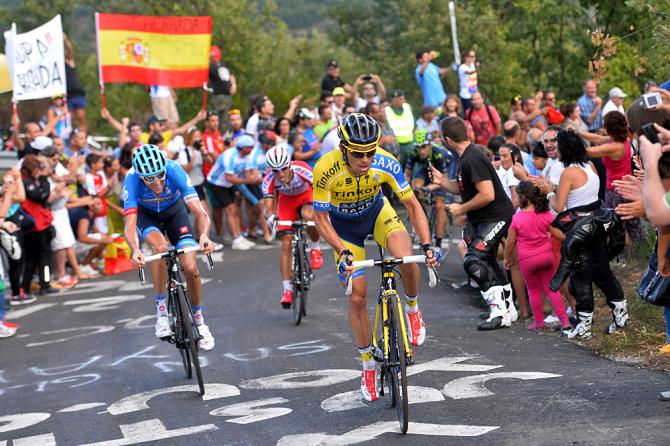Preview: Vuelta a Espana opening week closes with trio of summit finishes
Emblematic Lagos de Covadonga finish rounds off tough first ten days

The Vuelta a Espana moves into its first serious round of mountain stages on Saturday, with three consecutive summit finishes. Rounding off will be the ultra-difficult ascent to the Lagos de Covadonga preceding a much-deserved rest day on Tuesday.
The Vuelta last tackled the Lagos de Covadonga in 2014, with Polish climber Przemyslaw Niemiec taking the win. Time differences between the favourites were minimal, with Alejandro Valverde finishing second, and taking five seconds on Alberto Contador in fourth, and 12 seconds on Chris Froome, who was sixth.
This year, though, could be a different story, as locally-born rider Samuel Sánchez (BMC Racing) tells Cyclingnews. Coming after such a tough series of opening stages in Galicia, the combination of three summit finishes - first to the ultra-steep Camperona on Saturday after a flat, long drag across the plains of northern Castille, then to Sánchez's hometown climb of Naranco on Sunday, and finally to the Lagos de Covadonga on Monday could - he says, do much more damage
"You always have to respect any summit finish, but the ascent to Lagos is more than half an hour long, it's a really tough climb," says Sánchez, who is sixth overall and with BMC Racing teammate Darwin Atapuma in the lead before stage eight.
"Coming on the tenth stage, that's going to hurt a lot - and the legs are already hurting after such a difficult start to the Vuelta."
The 12.2 kilometre Lagos de Covadonga is the Vuelta's first 'Special Category' climb and summit finish, averaging 7.2 percent. For well over a decade, from its first ascent in 1983 when Marino Lejarreta won there, the Lagos was considered the most emblematic climb of the race, often with decisive battles for the overall, until it was upstaged by the Angliru – which was first climbed in 1999. Indeed, rather like Alpe d'Huez, there is a legend that whoever leads the Vuelta at the summit will be in atop the podium in Madrid - although rather like the Alpe d'Huez legend, it's by no means always true. Since 1997, and a win for Pavel Tonkov, victory there has gone to breakaway specialists like double Tour stage winner Juan Miguel Mercado, Russian's Andre Zinchenkov, or Caja Rural's Antonio Piedra rather than really big GC hitters.
On this year's 188-kilometre stage 10, the Lagos de Covadonga is immediately preceded by the shorter, first category, Alto del Fito climb. The Fito is famous for where Miguel Indurain dropped back and then abandoned the Vuelta, his last professional race barring one criterium, exactly 20 years ago in 1996. This year the Fito will begin the process of weeding out the main peloton, although as Sánchez points out, the 'weeding out' process has already started a week ago with the relentlessly undulating terrain in Galicia.
The latest race content, interviews, features, reviews and expert buying guides, direct to your inbox!
"There hasn't been a single stage where you can say, 'ah, it' just a thousand metres of vertical climbing' - no. It's been continuously up, down, up down, in every stage right from the start of this Vuelta, with 2,000 or 2,500 metres of climbing every day."
Sánchez prediction is for Sunday's 164.5-kilometre stage, which concludes on the second category ascent to Naranco is that it will likely be won from a break. It is one of the Vuelta's best-known climbs, and is likely to draw out huge crowds in support of locally-born Sánchez, but by far the easiest ascent of the three. However, "the Lakes are where the GC is really going to start to take shape."
As for the Camperona on Saturday, an eight-kilometre climb with ramps of up to 25 percent and last tackled in 2014, Sánchez says "it's really tough. In 2014 we went over another difficult climb beforehand, but this time, it's straight to the foot of the climb. And you've got to go up it just the same."
The other issue is, Sánchez says, that the weather is forecast to change radically, from heat to rain predicted for Sunday and Monday's stage, "and that will change things a lot, you don't know how your body will react, plus there's always more risk of crashes."
Following the interview, Sánchez hurt himself in a crash on stage seven - the same one that brought down Alberto Contador (Tinkoff) - but told Cyclingnews his injuries were only slight. As for whether having his team-mate Atapuma in the lead changes his own plans, he says that's not the case.
"Darwin's lead is a surprise, but he took his opportunity, and he did really well. It's quite touching to see, we're sharing rooms, and he's glued to the telephone all the day. It's nice to see how such a young rider - that's in comparison to me because I'm 38 - is living through that experience.
"But it doesn't change my own objectives, and there's a heck of a lot of the Vuelta still to come,"' he says, starting with the Camperona on Saturday.
To subscribe to the Cyclingnews video channel, click here.
Alasdair Fotheringham has been reporting on cycling since 1991. He has covered every Tour de France since 1992 bar one, as well as numerous other bike races of all shapes and sizes, ranging from the Olympic Games in 2008 to the now sadly defunct Subida a Urkiola hill climb in Spain. As well as working for Cyclingnews, he has also written for The Independent, The Guardian, ProCycling, The Express and Reuters.
